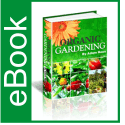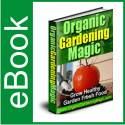Important Tips for Planting a Vegetable Garden
Important Tips for Planting a Vegetable Garden
Article by Derek Hambridge
If you decide to have a garden, there are numerous types to choose from; of course a vegetable garden is the most sensible. There is nothing that says you can only grow one garden, but it is nice to be able to eat what you grow and appreciate the appearance of it too. In this article we will be spotlighting practical hints on successfully growing nourishing vegetables in your garden.
There are large and small pests that will invade your garden – here is a quick overview of what they are. Gardens are a great hobby to have, but unless you protected from large animals such as rabbits and cats, and small animals and insects, your garden may suffer and not be bountiful. It really doesn’t take much for one animal to undo days of work on your part, so it makes sense for you to protect your garden with a fence. A good fence will not only keep out animals, but it can be used to support vegetables such as tomatoes, beans and peas.
Eliminating pests from your vegetable garden is an enormously crucial thing. Be that as it may, growing these tasty and healthful foods is not something you are doing, so all the insects can take advantage of them. When it comes to pest control, you are typically better off using natural and organic maneuvers, or else you gamble the possibility of tainting your vegetables with elements that can be toxic. Growing foods in the garlic and onion family is a great way to keep many insects away. Not only are these great items to have in your garden anyway, but they also repel many insects and other pests. An additional untreated option for fending off vermin is by using fish fertilizer, which will discourage unwanted bugs, for example, caterpillars and mites. You can spray your plants and vegetables with this stuff. Additionally, you can encourage some more helpful sorts of insects to take up residence in your garden. Praying mantises, ladybugs and lacewing flies, for example, are all good for keeping harmful insects away.
Vegetable gardens are most easily and effectively grown in garden beds that are raised. Your garden, especially if you are growing it in a small area, should definitely be raised. Different from conventional gardens, raised garden are very specific in regard to what is grown in them. A conventional garden will have more weeds than a raised garden, making them more ideal. From the soil that is used, to the vegetables that will be grown, raised gardens help you focus on what you are doing. The lack of open space, and the close proximity of the plants in one small area makes gardening, especially if you are a beginner, much more easy. You might want to use lumber for your raised garden because it is a very durable material; you could also use brick or concrete. Toxic substances must be avoided; remember, you are growing a vegetable garden.
There are many benefits to having a vegetable garden. If you are wanting to experiment with new types of food or a brand-new diet, gardening is the way to go. It will take a little bit of practice, gardening is something that you can do well at as long as you give an honest try. Growing vegetables, after you learn how to do it, will probably become your favorite pastime which you will learn to enjoy doing annually.
About the Author
The writer has penned several informative and interesting articles. Go and visit a few of his most popular on brinks home security system and self install home security. You may also like to view help on brinks home security system
Use and distribution of this article is subject to our Publisher Guidelines
whereby the original author’s information and copyright must be included.

 June 8, 2012
June 8, 2012 







